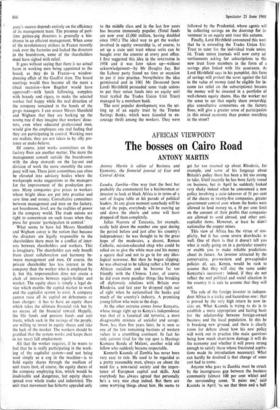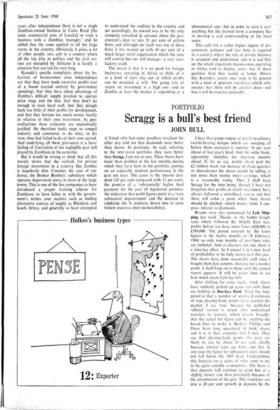The bosses on Cairo Road
AFRICAN VIEWPOINT ANTONY MARTIN
Antony Martin is editor of Business and Economy, the financial journal of East and Central Africa.
Lusaka, Zambia—One way (not the best. but probably the commonest) for a businessman or investor to look at black Africa is in terms of a sort of league table or hit parade of political leaders. At any given moment somebody will be top of the pops, everybody will be moving up and down the charts and some will have dropped off them completely.
Julius Nyerere of Tanzania, for example, easily held down the number one spot during the period before and just after his country's independence: he was thought to be the great hope of the moderates, a decent, Roman Catholic, mission-educated chap who could be relied on to give the white man and his money a square deal and not to go in for any ideo- logical nonsense. But then be began slipping; he was observed to be talking rather a lot about African socialism and he became far too friendly with the Chinese. Later, of course, he did even more peculiar things like breaking off diplomatic relations with Britain over Rhodesia, and last year he dropped right out of sight when he nationalised the banks and much of the country's industry. A promising young fellow who went to the dogs.
At the other extreme comes Jomo Kenyatta, whose image right up to Kenya's independence was that of a fanatical old terrorist, a most disagreeable mixture of socialist and savage. Now, less than five years later, he is seen as one of the few remaining bastions of western values in a crumbling continent. In fact his only current rival for the top spot is Hastings Kamuzu Banda of Malawi, another wild old fellow who suddenly became respectable.
Kenneth Kaunda of Zambia has never been very easy to rate. He used to be regarded as a pretty reasonable man, always on about the need for a non-racial society and the impor- tance of European capital and skills. And everybody has always agreed that personally he's a very nice chap indeed. But there are some worrying things about him. He seems to get far too steamed up about Rhodesia, for example, and some of his language about Britain's policy there has been a bit too strong to take. Until recently he has been fairly sound on business, but in April he suddenly looked very shaky indeed when he announced a new policy involving a state takeover of 51 per cent of the shares in twenty-five companies, greater government control over whom the banks were allowed to lend money to, a 50 per cent limit on the amount of their profits that companies are allowed to send abroad, and other anti- capitalist items. However, at least he didn't nationalise the copper mines.
This view of Africa has the virtue of sim- plicity, but it has some severe drawbacks as well. One of them is that it doesn't tell you what is really going on in a particular country or enable you to make reliable predictions about its future. An investor attracted by the conservative, pro-western and pro-capitalist policies of, say, Kenya, would be rash to assume that they will stay the same under Kenyatta's successor: indeed, if they do not reflect the real political and social situation in the country it is safe to assume that they will not.
The role of the foreign investor in indepen- dent Africa is a tricky and hazardous one: that is proved by the very high return he now in- sists on. What Kaunda is trying to do is to establish a more appropriate and lasting basis for the relationship between foreign-owned business and the local population. In this he is breaking new ground, and there is clearly room for debate about how his new policy will work out in practice (the main questions being how much short-term damage it will do the economy and whether it will prove strong enough to satisfy those whose frustrated aspira- tions made its introduction necessary). What can hardly be doubted is that change of some sort had to come.
Anyone who goes to Zambia must be struck by the incongruous gap between the business community (almost 100 per cent white) and the surrounding scene. It pains me,' said Kaunda in April, `to see that three and a half years after independence there is not a single Zambian-owned business in Cairo Road [the main commercial area of Lusaka] or even a business with a Zambian manager,' and he added that the same applied to all the large towns in the country. Obviously it pains a lot of other people, too, and in a country where all the top jobs in politics and the civil ser- vice are occupied by Africans it is hardly a situation that can last for very long.
Kaunda's specific complaints about the be- haviour of businessmen since independence are that they have made excessive profits (out of a boom created entirely by government spending), that they have taken advantage of Zambia's difficult supply position to operate price rings and the like, that they don't do enough to train local staff, that they plough back too little of their profits for development, and that they borrow too much money locally in relation to their own investment. As gen- eralisations these criticisms are undoubtedly justified. He therefore tooks steps to compel industry and commerce to do what, in his view, they had failed to do of their own accord. And underlying all these grievances is a basic feeling of frustration at the negligible part still played by Zambians in the economy.
But it would be wrong to think that all this merely shows that the outlook for private foreign investment in a country like Zambia is hopelessly dim. Consider the case of cac Stores, the Booker Brothers' subsidiary which operates department stores in most of the large towns. This is one of the few companies to have introduced a proper training scheme for Zambians, to have fallen in with the govern- ment's wishes over matters such as finding alternative sources of supply to Rhodesia and South Africa, and generally to have attempted to understand the realities in the country and act accordingly. Its reward was to be the only company consulted in advance about the gov- ernment's plan to take 51 per cent of certain firms, and although cac itself was one of those firms it has wound up with 49 per cent of a much larger retail organisation which the state will control but cac will manage: a very satis- factory result.
The moral is that it is no good for foreign businesses operating in Africa to think of it as a kind of inert clay out of which profits can be moulded at will. The going rate of return on investment is a high one—and in Zambia at least the market is expanding at a phenomenal rate—but in order to earn it over anything but the shortest term a company has to develop a real understanding of the local scene.
This calls for a rather higher degree of dis- cernment, patience and tact than is required in a country where the role of private business is accepted and understood, and it is sad that on the whole expatriate businessmen operating in Africa tend to display rather less of those qualities than they would at home. Moves like Kaunda's recent ones tend to be greeted with a kind of ignorant truculence which only ensures that there will be another dose—and that it will be even less palatable.







































 Previous page
Previous page